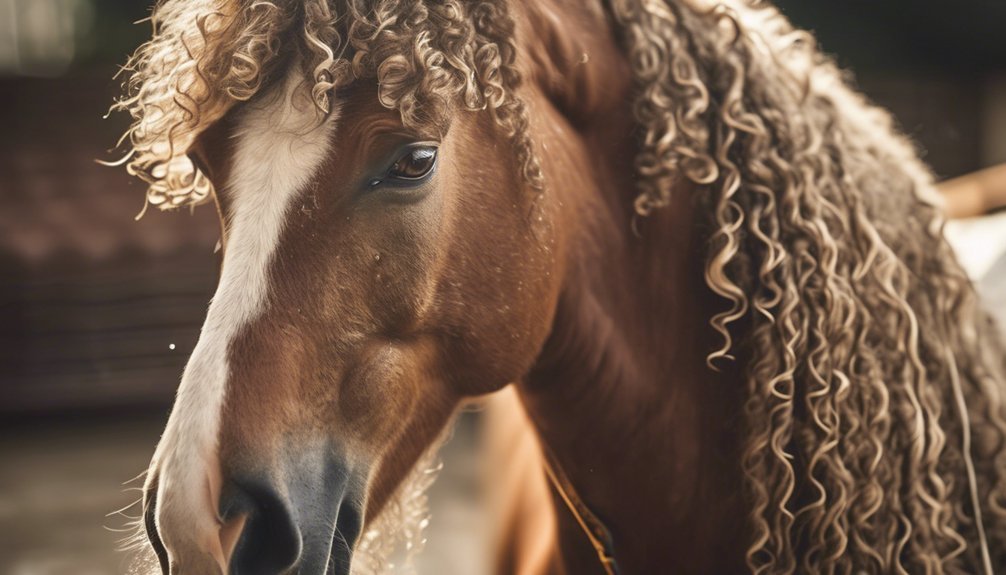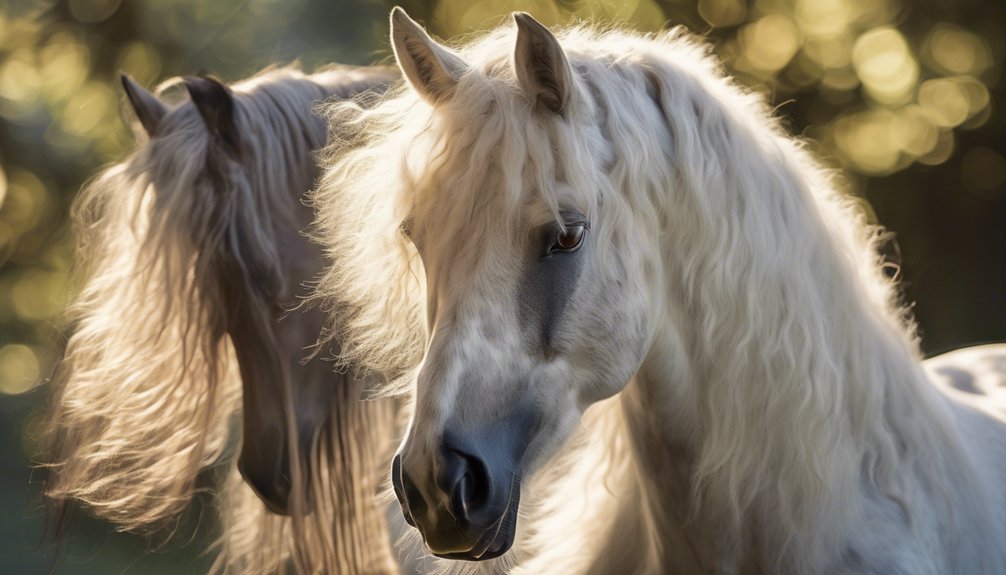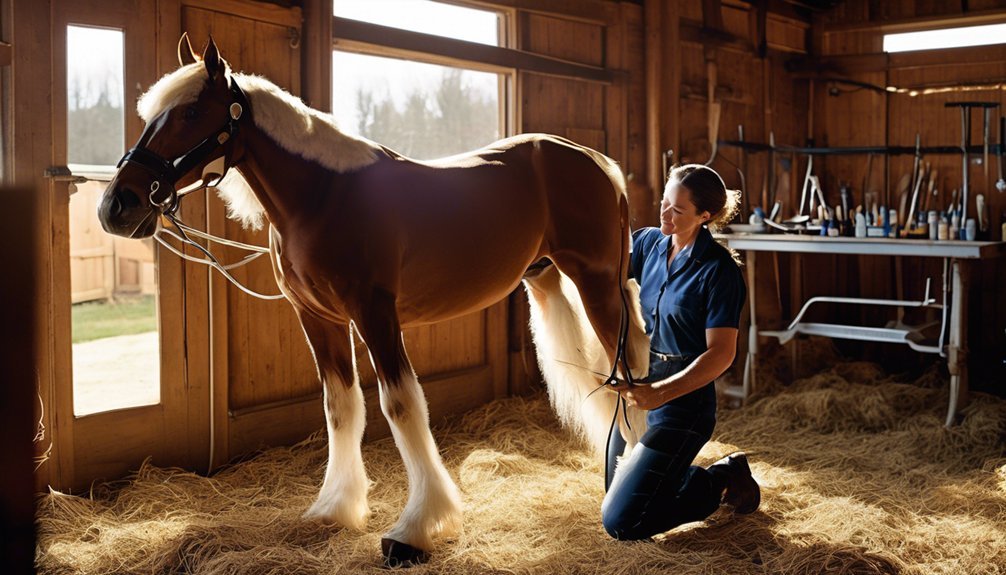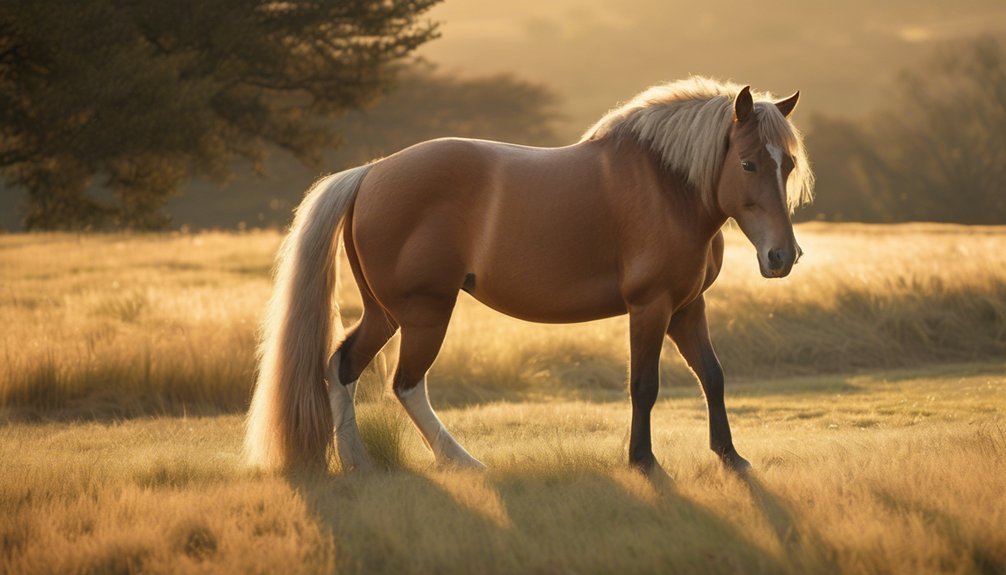
Grooming a horse with a sleek coat can feel straightforward, while a curly coat presents its own set of challenges. Understanding the unique needs of these horses is crucial for maintaining their coat's health and appearance. With the right tools and techniques, you can keep those curls looking their best. But what specific grooming strategies should you employ to ensure their unique texture thrives? Let's explore the essential practices that make all the difference.
Key Takeaways
- Brush at least three times a week using a wide-toothed comb to gently detangle knots without damaging the curly coat.
- Use a soft-bristled grooming brush to smooth the coat and distribute natural oils evenly.
- Bathe with lukewarm water and a gentle shampoo designed for curly or sensitive coats to maintain skin health.
- Regularly check for skin irritation and keep the horse's living area clean and dry to prevent allergies.
- Incorporate a diet rich in omega fatty acids to promote healthy skin and coat condition.
Understanding Curly Coats: Unique Characteristics

Curly coats on horses, often seen in breeds like the Curly Horse or Bashkir Curly, present unique characteristics that set them apart from their smoother-coated counterparts.
Understanding curly coat genetics is essential for you as an owner; these coats arise from a specific genetic mutation affecting hair structure. Unlike straight hair, the curly coat's texture helps with coat moisture retention, making it advantageous in various climates.
This moisture retention can keep your horse warmer in cold weather, but it also means you'll need to monitor their skin health closely. Pay attention to any signs of irritation or dryness, as the curly texture can sometimes trap dirt and debris.
Embracing these traits allows for a deeper bond with your curly-coated companion.
Essential Grooming Tools for Curly-Coated Horses
When caring for horses with curly coats, having the right grooming tools is key to maintaining their unique texture and skin health. You'll want to invest in specific grooming brushes that cater to curly hair, as well as effective coat detanglers to keep their mane and coat manageable. Below is a helpful table to guide you in selecting the essential tools:
| Tool Type | Purpose | Recommended Features |
|---|---|---|
| Grooming Brush | Removes dirt and debris | Soft bristles for curls |
| Rubber Curry Comb | Stimulates skin and removes loose hair | Flexible, easy to clean |
| Coat Detangler | Eases knots and tangles | Lightweight, non-greasy |
| Mane Comb | Detangles the mane | Wide-toothed, durable |
| Hoof Pick | Cleans hooves | Sturdy, comfortable grip |
With these tools, you'll ensure your curly-coated horse feels comfortable and looks fabulous!
Regular Brushing Techniques to Prevent Tangles

To keep your horse's curly coat in top condition, regular brushing is essential for preventing tangles and maintaining a healthy mane. Aim for a brushing frequency of at least three times a week, adjusting based on your horse's activity level and coat type.
Start with a wide-toothed comb to gently work through any knots, applying detangling techniques by holding the hair near the roots to minimize pulling. Follow up with a softer brush to smooth the coat and distribute natural oils.
Don't forget to check under the mane and tail, as these areas often hide the sneakiest tangles. With patience and consistency, you'll keep your horse looking fabulous while strengthening your bond during grooming sessions.
Bathing Best Practices for Curly Coats
While it may seem tempting to bathe your horse frequently, doing so with a curly coat requires a bit of finesse to avoid stripping essential oils.
You'll want to start by ensuring the bath temperature is lukewarm, as this keeps your horse comfortable and encourages relaxation.
When selecting a shampoo, choose one specifically formulated for curly or sensitive coats, as these are gentler and help maintain moisture.
Apply the shampoo sparingly, focusing on areas that need more attention. Rinse thoroughly to avoid residue, which can lead to irritation.
After bathing, gently towel-dry your horse to remove excess water without disrupting the curl pattern.
With these practices, you'll keep your horse's coat clean and healthy, enhancing its natural beauty.
Importance of Conditioning Products

After ensuring your horse's coat is clean and well-maintained, conditioning products play a vital role in enhancing its health and appearance.
These products offer essential conditioning benefits, such as moisturizing the coat and preventing breakage, especially important for curly coats that can be more prone to dryness.
When selecting conditioning products, look for those with natural ingredients like coconut oil or aloe vera, which nourish without harsh chemicals.
Regular use can improve texture and shine, making your horse look its best.
Product recommendations include leave-in conditioners or detangling sprays that can simplify grooming sessions.
Managing Skin Sensitivity in Curly-Coated Horses
Managing skin sensitivity in curly-coated horses requires a proactive approach to ensure their comfort and well-being.
Start with a consistent skin care routine, using gentle, hypoallergenic products specifically designed for sensitive skins. Regularly check for signs of irritation or allergic reactions, such as redness or swelling. If you notice any issues, consult your veterinarian for effective allergy management strategies.
Keep your horse's living environment clean and dry to minimize exposure to allergens like dust or mold. Additionally, consider a balanced diet rich in omega fatty acids, which can improve skin health and reduce sensitivity.
Your attentiveness to these details will help create a nurturing atmosphere, allowing your curly-coated companion to thrive comfortably.
Seasonal Grooming Considerations

As the seasons change, it's crucial to adjust your grooming routine to meet your horse's evolving needs.
During spring, prepare for seasonal shedding; your horse will lose their winter coat, so frequent brushing is essential to remove loose hair and prevent matting.
In summer, be mindful of climate impact; hot weather can lead to sweating, requiring more regular baths to keep their coat clean and fresh.
In fall, help them transition by maintaining a consistent grooming schedule, focusing on removing dirt and debris that can cling to their curly coat.
Winter demands special attention; ensure you're checking for moisture and any skin issues beneath their thicker coat.
Adjusting your approach with each season helps keep your horse healthy and comfortable year-round.
Signs of Coat Health and When to Seek Help
A well-groomed coat is a key indicator of your horse's overall health and well-being. You should be on the lookout for coat shine, which reflects good nutrition and care. A glossy coat usually means your horse is healthy and happy.
Conversely, a dull or patchy coat can signal issues like skin irritations, allergies, or nutritional deficiencies. Pay attention to health indicators such as excessive shedding, flakiness, or changes in texture. If you notice any of these signs, it's time to consult your vet.
Regular grooming not only enhances their coat's appearance but also strengthens your bond. Remember, your horse's coat is a window to their health; keeping it in top shape is essential for their well-being.
Frequently Asked Questions
Can I Use Human Grooming Products on My Curly-Coated Horse?
You shouldn't use human grooming products on your curly-coated horse. Human products may contain harmful ingredients for equines. Always prioritize grooming product safety and choose items specifically formulated for horses to ensure their health and comfort.
How Often Should I Trim My Horse's Curly Coat?
If you're aiming for a well-groomed look, you should trim your horse's curly coat every 4-6 weeks. Regular trimming frequency helps with coat maintenance and keeps your horse feeling comfortable and looking sharp.
Are There Specific Breeds Known for Curly Coats?
Yes, certain breeds are famous for curly coats, like the American Bashkir Curly and the Curly Horse. These breeds possess unique curly coat characteristics, providing warmth and protection, making them truly special companions in the equestrian world.
What Dietary Changes Can Improve My Horse's Coat Condition?
To improve your horse's coat condition, consider adding dietary supplements rich in coat nutrients like omega fatty acids and biotin. These can enhance shine and overall health, ensuring your horse looks and feels its best.
How Can I Protect My Horse's Coat During Extreme Weather?
When weather's raging like a wild beast, you've got to ensure your horse's coat insulation stays intact. Use breathable blankets and shelter for weather protection, keeping your horse cozy and safe from the elements.
Conclusion
In conclusion, grooming your curly-coated horse is a rewarding journey that ensures their coat remains as vibrant as a field of wildflowers. By using the right tools and techniques, you can maintain their unique texture and health. Remember to brush regularly, bathe gently, and always pay attention to their skin sensitivity. With consistent care, you'll not only enhance their appearance but also strengthen your bond, making every grooming session a delightful experience for both of you.





